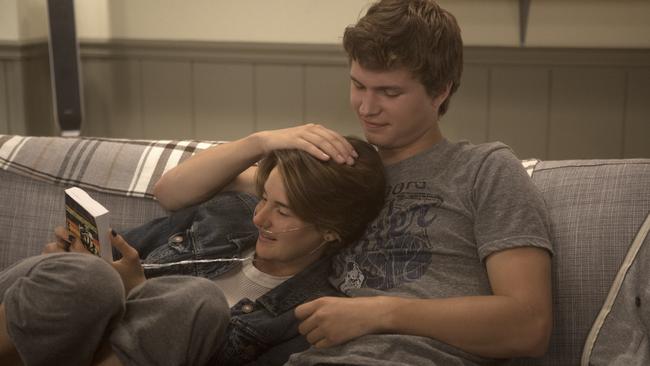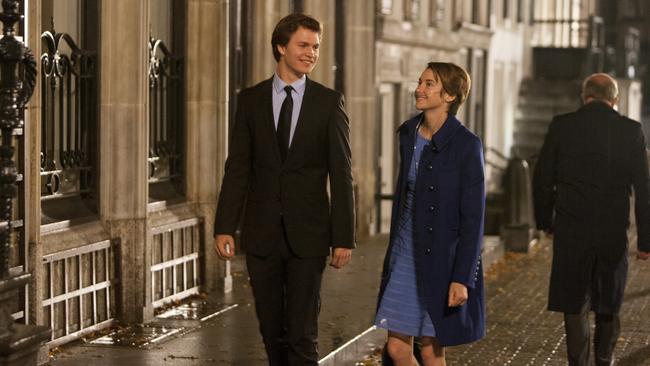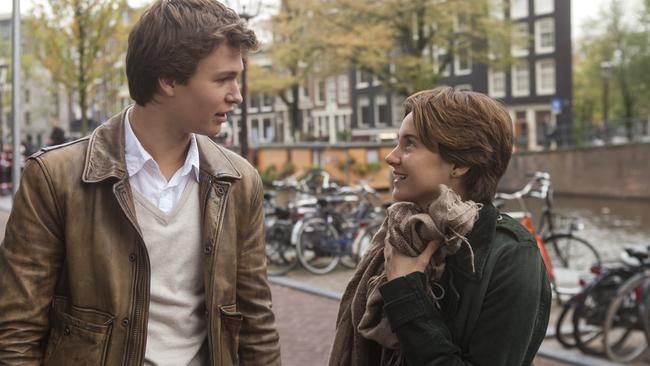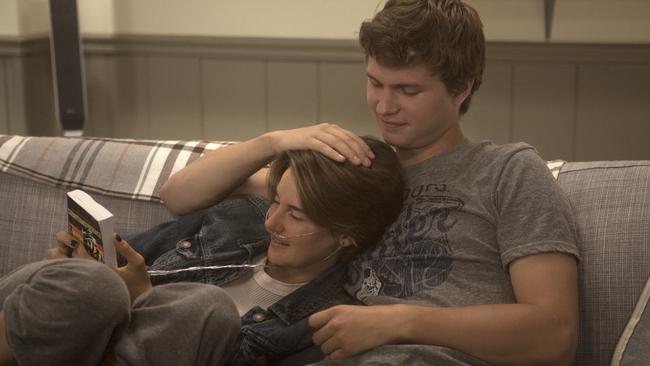Hollywood hippie Shailene Woodley is so hot right now. But she’s all like, meh
WE can’t get enough of “sick lit” and Shailene Woodley. Which is why we’re loving that she is starring in the film adaptation of The Fault In Our Stars.
WE can’t get enough of “sick lit” and we can’t get enough of Shailene Woodley. Which is why we’re loving that she is starring in the film adaptation of John Green’s teen novel, The Fault In Our Stars.
Generation Z’s voracious appetite for “sick lit” — a term coined to describe novels in which at least one major character has a terminal illness — is actually a sign of their rude psychological health, according to one specialist publisher.
Critics of the popular genre, best represented by John Green’s critically acclaimed bestseller, The Fault In Our Stars — now a major feature film starring Divergent’s Shailene Woodley — dismiss it as a morbid exploitation of the lucrative young adult market by booksellers looking to fill the vacuum left by vampires and dystopian fiction.

But Allen & Unwin’s Erica Wagner reckons there’s nothing like death to make a reader reflect on what’s important to them in their lives.
“Sick lit? I can’t bear it when people reduce it down to that,’’ says Wagner, who specialises in young adult and children’s fiction.
“When you put characters into such extreme situations, they have to decide what matters.
“The best way to think about how we want to live is to ask: ‘well, what would I do if I knew I was going to die?’
“It’s a question that throws up really interesting answers — especially when it’s a young person who hasn’t had all the experiences they might have hoped for. In that case, you are projecting forward to what you would like. So I think it’s very interesting and positive.”
Wagner sees the hunger on the part of contemporary teenagers for such material as a cause for great optimism.
“I have a huge amount of hope in this generation. They are not going to have the security of a job for life so they are much more flexible,” Wagner says.
“They are more communal in their way of thinking; that’s why you have things like crowd-funding to get their projects off the ground.
“Connectivity has its pros and cons, but it’s a symbol again of what their power might be in the future.”
In light of Wagner’s comments, the casting of Hollywood “hippie” Shailene Woodley in the role of Hazel Grace Lancaster, The Fault In Our Stars’ sharp-witted and fiercely independent heroine, seems entirely appropriate.

The 22-year-old actor, well known for her alternative, “natural beauty” counter stance to Hollywood’s airbrushed glamour factory, is the perfect role model for a generation that is inclined to question contemporary social and cultural values.
When asked whether she regretted the fashion furore caused by her decision to wear comfy five-toe shoes to a Golden Globes after-party, Woodley replied tartly: “If people spent as much time thinking about the genocides going on in Africa and around the world as they do the shoes that actors wear to after-parties, the world would be a much more peaceful environment.”
During an earlier interview for her breakthrough performance opposite George Clooney in The Descendants, Woodley knew exactly what she would do if she ever fell out of favour with the notoriously fickle film industry,
“I would be a herbalist,” she said at the time.
“I do my own home study. There’s always something brewing in my witch’s cauldron.”

Now that she’s the face of a multimillion-dollar action franchise — Woodley is to shoot the three Divergent sequels (Insurgent and Allegiant Part I and 2) back to back — Woodley doesn’t have too much time to whip up healing potions.
But though she currently lives out of a suitcase — Woodley told chat show host Jimmy Kimmel this month she can pack everything she owns into one carry-on sized bag after giving her house away to her grandmother — she still carries a travel apothecary kit with her wherever she goes.
Given Woodley’s lifestyle choices, it’s hardly surprising to discover that she connected deeply with Green’s book.
BOOK REVIEW: THE FAULT ON OUR STARS
HOTTEST CELEBRITY PHOTOS: SHAINE WOODLEY
WHY EVERYBODY IS TALKING ABOUT DIVERGENT
Before auditioning for the role, she wrote him a letter seeking, well if not his approval, then perhaps his blessing.
“I saw him as the captain of the ship even if he wasn’t the captain of the movie. He was the one who created this world,” she says.
Taking its title from a line in Shakespeare’s play Julius Caesar, The Fault in Our Stars tells the story of a blossoming friendship between the terminally ill Hazel, whose thyroid cancer has now spread to her lungs, and Augustus Waters (Ansel Elgort), a charismatic young man who has lost a leg to osteosarcoma. They meet when Hazel’s mother (Laura Dern) persuades her to attend a teenage support group.

While clearly difficult and thought-provoking, Woodley doesn’t find the subject matter the least bit morbid.
“Death is something that’s inevitable and something we all have to deal with at some point in our lives,’” she says. “It’s also one of those things we can’t explain as human beings.
“Death and birth are the two things we always question. Inherently, as human beings, it’s something we are curious about and we like to explore because it’s one of those things that we will never actually have any answers to.”
While researching the role, Woodley — who cut off her trademark long hair to play Hazel whose hair is still growing back after chemotherapy — met a bunch of young cancer sufferers.
“It was confronting, yes. But it’s just part of their lives. Just because somebody has cancer, that doesn’t define who they are. It was amazing to see that,” she says. “It was also important to me to know what it was like to not be able to breathe very well. Hazel has to have oxygen on her constantly. I wanted to know what that was like.”

There is one school of thought that says children should be protected from life’s harsh truths for as long as is humanly possible.
And some pedagogues believe the already angst-ridden nature of adolescence is compounded or exaggerated by dark subjects and psychologically disturbing material.
But Wagner believes the heightened dramatic situations in stories about terminally-ill teenagers such as The Fault in Our Stars, Before I Die, by British author Jenny Downham, and Everything Left Unsaid, by Queensland writer Jessica Davidson, speak so strongly to teenagers because they already experience life so intensely.
“It’s normal to have extreme emotions at that age,” she says.
“Everybody talks about the bodily changes that are going on, but what you do with those feelings that occur when the hormones kick in and you suddenly want to have sex with everyone.
“(Fiction) is a way of broadening your experience without necessarily living it.”
Fellow publisher Margrete Lamond, of Little Hare Books, goes one step further.
She sees fiction in evolutionary terms, pointing to recent scientific research into mirror neurons.
“Reading affects the biology of the brain.
“When we read something, our brains automatically light up, developing the neural pathways that would be laid if we had actually been experiencing these things in the physical world.”
Experiments have shown that the brain of a moviegoer watching somebody being attacked by a lion will respond in an almost identical manner to an actual physical attack.
“On an absolute, biological level, your brain is physically playing out those things without your body or your psychology being in danger,” Lamond says.
Because society is so incredibly complex, fiction provides templates we can access in similar situations, says Lamond, who describes storytelling as a survival mechanism.
“It provides patterns of behaviour, psychological amendments and adaptations that we are not likely to encounter in our own lives,” she says.
“The more stories you read, the more narratives you ingest, the more pathways it lays down in your brain for different possibilities.
“Our brains are hungry for the full spectrum of stories in the same way our bodies are hungry for the full spectrum of nutrients through food.”
For teenagers, who are developmentally programmed to test social boundaries and push parental limits, fiction provides a safe environment in which they can imaginatively explore risk-taking behaviour without playing it out in real life.
Limiting them to safe subjects is a kind of emotional censorship, says Wagner.

“It’s as if we are saying you are allowed to feel this and this, but you are not allowed to feel that. And yet they are.
“So I would absolutely defend wise and well-executed books coming from the right place — I wouldn’t just glibly say sometimes you can read something that is extremely sad and you wonder where’s the hope in that, but there is still something life-affirming about it.”
Nor does Wagner buy the argument that there is a disproportionate focus on death and disease in YA literature, given that cancer affects one child in every 500.
“I feel like people are so literal, often, with the way they approach books,” she says.
“Isn’t it also a metaphor for loss, for change, for your pet dying? People will experience all kinds of hardship. This is a window to explore those feelings but it might not be that precise situation.
“These stories can be very meaningful to teenagers. Yes, they might wallow in it a bit but I don’t think that’s necessarily bad. It’s quite good to experience those feelings within the context of a book and then test yourself against it.
“I don’t think the books are going to cause the harm. It’s more if it’s actually a spiral caused by a whole lot of other issues.”
Wagner isn’t averse to pushing the envelope, herself, on occasion.
As a publisher, she has been responsible for green lighting provocative YA novels such as Gordon Reece’s Mice (2010), about a victim of bullying who is pushed one step too far, and the upcoming book A Small Madness, by Diane Touchell (Creepy & Maud), based on the true story of a teenage couple who murdered their baby.
But she is not saying that anything goes.
“I have said no to manuscripts. Sometimes it’s almost a tone thing. I can’t even admire it, really, because I feel it is too relentlessly negative,’’ says Wagner.
“But I really think that (young adult) writers and publishers are very conscious of their audience and that they try and write as honestly and authentically as they can, and therefore it’s appropriate.
“If I read a really sad book, I am not necessarily going to go out and read another really sad one immediately after. But it’s like you want the variety.
“And I do believe that in the darkest dark, you see the brightest light.
“And it if comes from a true, caring impulse, you can go to these dark places.”
The Fault In Our Stars opens Thursday.



